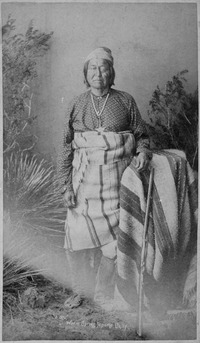Loco (Apache) facts for kids
Quick facts for kids
Loco
|
|
|---|---|
| Jlin-tay-i-tith, "Stops His Horse" | |

Loco, Warm Springs Apache Chief
|
|
| Chiricahua leader | |
| Personal details | |
| Born | 1823 |
| Died | 2 February 1905 Fort Sill, Oklahoma |
| Resting place | Fort Sill, Oklahoma |
| Spouse | Ruth |
| Known for | Pursuing peace between Apaches and whites |
Loco (1823–1905) was an important Apache chief. He was part of the Mimbreño band of the Chiricahua Apache tribe. Loco was known for always trying to find peace with the US Army. This was different from some other Apache leaders like Victorio and Geronimo.
What Does His Name Mean?
Loco's Apache name was Jlin-tay-i-tith. This name means "Stops His Horse." Some people thought he got the nickname "Loco" because he was "crazy" enough to trust white men. However, most historians do not agree with this idea.
A different theory explains his name. Bud Shapard, a former government official, said Loco got his name from a battle. This battle was against the Mexicans. Loco bravely faced gunfire to save an injured warrior. Loco himself told this story to John Gregory Bourke in 1882.
Loco's Time as a Leader
After some other important Apache chiefs died, the Mimbreño Apache bands faced challenges. They were pressured by the US Army to move from their homes. They tried to settle in areas like Ojo Caliente and Cañada Alamosa.
Loco became a chief for the Copper Mines Tchihende band. Another chief, Victorio, led the Warm Springs Tchihende. Both bands were forced to move to different reservations. The government later decided to move them to the San Carlos Apache Indian Reservation.
In 1877, Victorio and Loco led their people back to Ojo Caliente. But in 1878, soldiers were sent to bring them back to San Carlos. Victorio decided to fight, but Loco was arrested. He could not join Victorio's last fight in 1879-1880. Loco stayed at the San Carlos reservation.
In 1882, some Apaches, including Geronimo, forced Loco to leave for Mexico. Loco chose to fight against these other Apaches instead. In 1886, Loco traveled to Washington, D.C. to talk about peace. However, he was made a prisoner and sent to Florida.
What Is Loco Remembered For?
Loco is remembered for his strong belief in peace. He was different from other Apache leaders like Geronimo and Victorio, who often chose to fight.
Loco also believed in education. He was the first chief to send his own children to school. This happened at the San Carlos Agency in 1884. Later, another of his sons was among the first to attend an Indian school in Alabama in 1889.
 | Bessie Coleman |
 | Spann Watson |
 | Jill E. Brown |
 | Sherman W. White |

